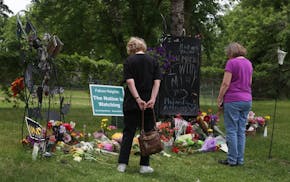For some St. Paulites, the state of the city hinges on how well its youth are served. For others, it can simply be a matter of how fast the potholes get fixed.
Mayor Chris Coleman touched on both topics Monday in his ninth annual State of the City address, while reissuing his call for private investment to capitalize on recent publicly subsidized projects such as light-rail and a new Lowertown ballpark. Seizing "on the momentum of today to build a better tomorrow" was how he put it.
Coleman spoke before a room of city, business and nonprofit leaders at the new Arlington Hills Community Center, a $14 million combination library and recreation center slated to open May 22.
He said that the center, in the Payne-Phalen neighborhood on the East Side, was an example of city collaboration — in this case, between the library system and the parks department — that can engage young people, serve families and close equity gaps for minority groups.
Coleman announced no new initiatives in his 29-minute address, instead using most of the speech to summarize progress made in the last year in youth programs, the arts, public transit and on the homelessness issue.
He said the city had secured a state grant of nearly $200,000 to extend citywide a youth violence prevention program launched downtown last summer with the help of the police and YWCA. In the three months of the pilot program, he said, juvenile arrests for serious crimes went down 43 percent and serious crime overall fell 21 percent.
The mayor said seven rec centers, including Arlington, will add hours to help with youth development. The city will expand this year the Right Track youth job program, which placed 21 high school juniors and seniors last summer with 14 companies in jobs paying a total of $50,000 in wages.
Coleman also brought up "the P-word," an immediate concern in the minds of many residents: potholes.
He said that he is asking the city's Public Works Department to call back to work laid-off street repair workers to address the problem, but added that long-term solutions also were also needed to reconstruct the city's "deteriorating infrastructure."
The worst streets in St. Paul — what Coleman dubbed "the Terrible 20" — will cost more than $70 million to rebuild, he said. He called on the Legislature or Congress to pass transportation bills that would help the city begin the work.
State lawmakers last week took up a bill to earmark $15 million for pothole repair in the state, including $5 million for city and county roads. However, St. Paul's share of that pie would likely amount to only $80,000.
Minneapolis Mayor Betsy Hodges has said she wants the Minneapolis City Council to appropriate an extra $1 million for pothole repair. Coleman didn't specify a figure, but St. Paul council members agreed with him that the need is great, not just to patch streets, but rebuild them.
"I'm glad to see the mayor call it out. The hard part is financing for a project that size. … We don't have $70 million in cash sitting around," Council President Kathy Lantry said.
"Many of our projects are long-term, and often those who begin them don't get to see them finished," Coleman said, concluding his speech. "But we do this work not for instant gratification or recognition, but to create a better place for the future of those in our city."
Kevin Duchschere • 651-925-5035

Falcon Heights, St. Anthony move toward renewing police partnership severed after killing of Philando Castile
January assault on elderly man turns deadly, marking eighth homicide in St. Paul

Israel-Hamas war creates 'really fraught times' at Minn. colleges

Florian Chmielewski, former senator and Funtime Band accordion player, dies at 97

